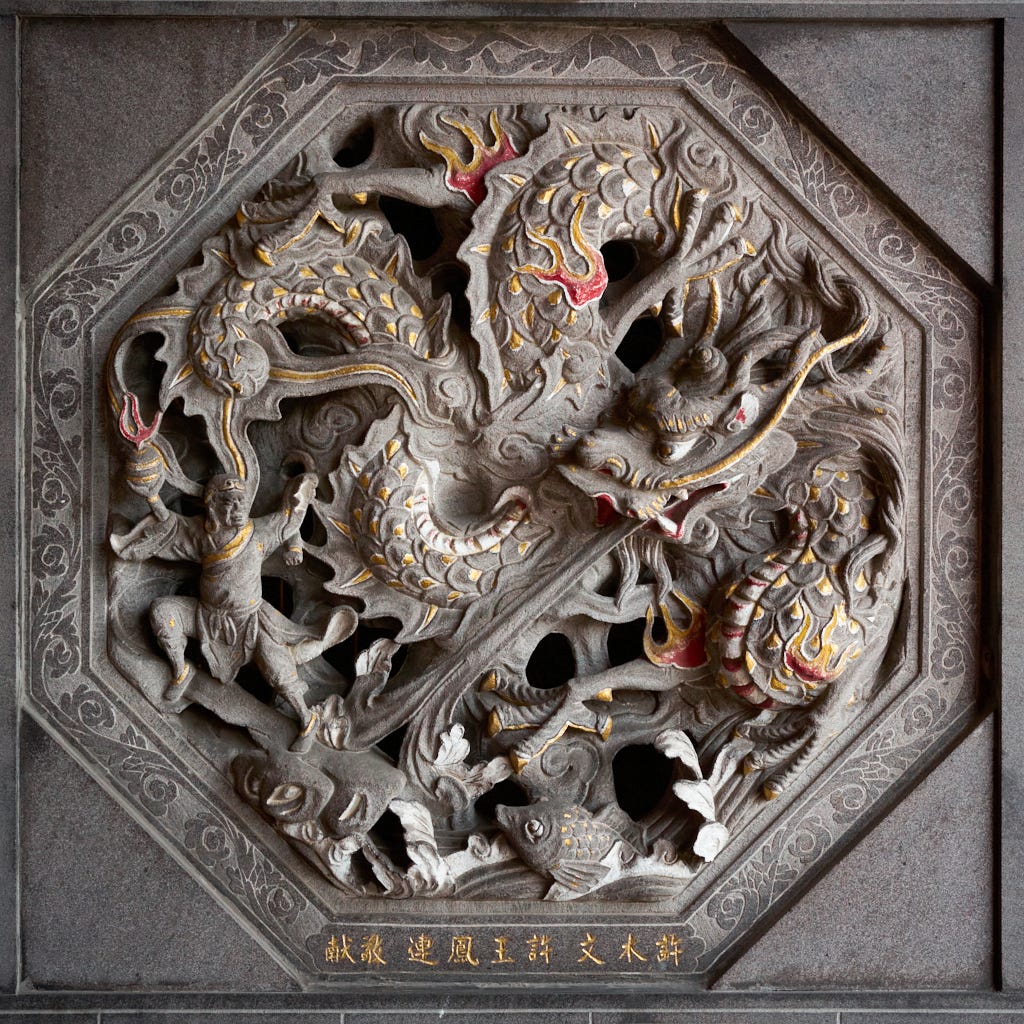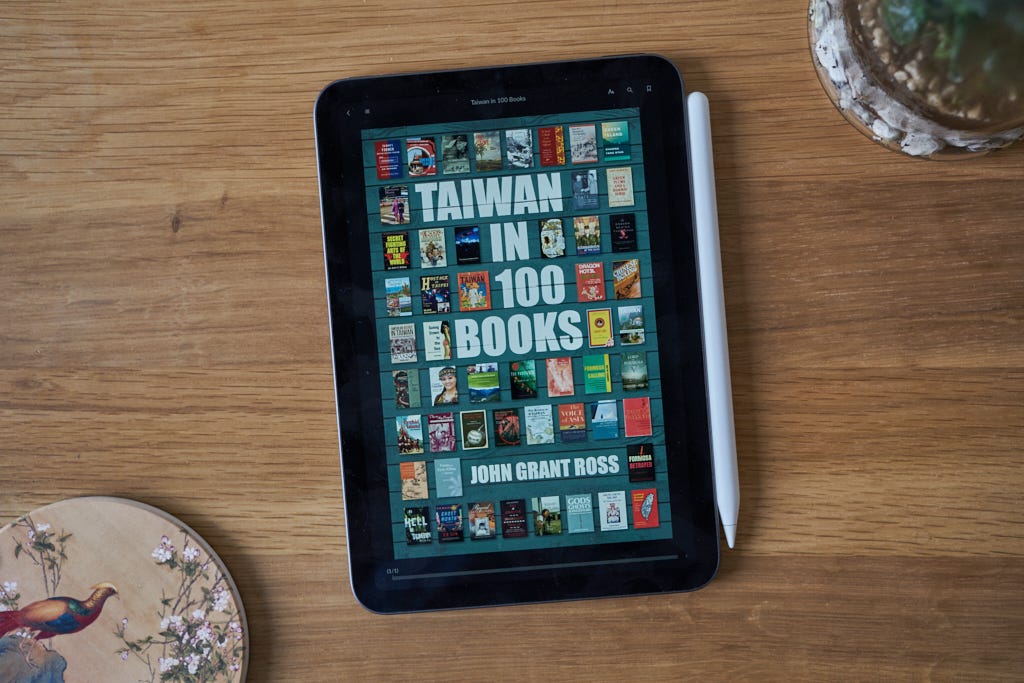Too much Bulls**t
Which words describe that all I want is the falling world to crash softly ?
Taiwan
This is the first issue of Benerkenswert, Welcome!
While a big introduction might be in order, let’s start simple. Overall, life is very good and Anna and I mostly found our pace and place. Summer is as hot and humid as expected, with a few surprise cloudbursts and typhoons mixed in for more action. ACs are as much a necessity as heaters in the European winter.
Art + Work
I am still occupied with my research while experimenting with some new initiatives and ideas on the side. Compared to Berlin, Taipei feels more conservative and The Hustle does not come as easy as I am used to. Networks seem to be denser, which means that getting even loose connections with Taiwanese institutions is difficult, connecting to the European bubble rather easy. I try to look at this not as a lack of big opportunities but rather an opportunity to focus, and am making good progress on my PhD and related work in turn, with a recent first-author publication and three further papers deep in the pipeline.
On the artistic side, photography and writing are taking over the bulk of my creative headspace, while music is taking a back seat. June was special in that I took a couple of days off to finalize my homepage - a passion project I had thought and pottered about for quite a while. I always liked homepages as a way to learn more about people - especially if they are a bit chaotic in a charming and personal way. Think first date more than CV. I am quite fond of and happy with the final outcome and it was much fun to get it all together.
The homepage is also the reason why this mail is more of a retrospect and summary. Future updates will be more incremental and I am looking forward to talk about them in more detail. Please head over to find:
My Quarantine Diaries, telling the story of arriving in Taiwan and why I am here.
My Year-1-Cesura, reflecting on the meaning of this all.
Summaries of my research and my side-gigs.
Additionally, I started a small essay series on photography (as a reference point for other Taipei photographers - I hope to do more photo safaris!) and also published older poems as well as reports about my musical engagements.
Ghost Money and Exorcism: Photo safari through Wanhua
One of the highlights of June was a photo safari I did in Taipei’s Wanhua district together with fellow PhD candidate and photographer Naomi Hellmann. Wanhua is the oldest of Taipei’s districts and a great place to witness many of Taiwan’s old traditions related to honoring ancestors and appeasing their ghosts. We were lucky to witness (and capture!) not only the burning of Ghost Money and food donations for people’s ancestors, but even what seemed to be a cleansing ritual. All images in this issue are from that day. Please head over to the photo essay on my homepage to see more of them.
Recommendations
I enjoy the creations of the courageous and cursed ones who follow their inner calling, no matter what the market thinks about that. That is art and it deserves to be shared! (Oh, and the market might like it nonetheless, of course, this is not a normative statement!)
Book: John Grant Ross, Taiwan in 100 books (★★★★★)
Ross‘ book was among the first I read on Taiwan and is still among my favourites. It reads like a kind of reading journal, or rather, like going to your dry-humoured neighbour (the one with shelves up every wall) to borrow a book and not leaving for the afternoon because both of you can't really decide which one to pick. Ross is a New Zealander who moved to Taiwan many years ago. Living outside the main metropolitan areas, he works as a language teacher like many foreigners here, but mostly enjoys his hikes, family, beer, and quiet. His way is not the self-aggrandising way common in the contemporary American non-fiction literature. Rather, his writing style is playful, almost poetic, flavoured with historic details, snappy comments...
The deadly fight for Taiwan centered on Fort Zeelandia is Taiwan’s single greatest story. Other events in Taiwan’s history are missing some narrative ingredients and a certain X factor
...common wisdom...
It’s hard to respect a man if his seemingly strident beliefs are so pliable that they never translate into a personal cost in the real world.
...and dark British-ish humour (pardon me, I am not familiar with New Zealand), full of self irony:
I’m glad Martinson describes the hardships of life on Orchid Island. As a curmudgeonly cynic (though I prefer to think of myself as a bruised romantic), I’m allergic to glowing descriptions of tribal life.
Taiwan in 100 books is a great start to learn more about the broad arc of Taiwan's past, some lovely cultural details, and a few historical peculiarities—all in a way much less dry than the (recommendable) wikipedia article, but not less informative. While—luckily!—it is all but a political book, it doesn't ignore the thundering background noise of 21st century global politics, voicing less Grand Theories but rather what is common frustration, sorrows, and inspiration among expats here.
Cole lambasts the Western world for ignoring Taiwan’s plight – a free, peaceful democracy being bullied by an authoritarian regime – and for choosing, from greed and cowardice, to side with the aggressor. And worse, many in the West resent Taiwan because, as Cole astutely states, it is "a constant reminder of our double standards.... We know what we’re doing is wrong, but we do it nonetheless. And we blame Taiwan for nagging at our conscience." (...) And so we turn to the soft-power war, the need to promote Taiwan’s story to the world and also its strategic importance to the region. I believe books have an important role in fighting Taiwan’s good fight — not books that are little more than clumsy government propaganda pieces, not political polemics, not even war thrillers, but works that highlight and humanize Taiwan as the peaceful, tolerant civil society it is.
I would lie if I'd say that thoughts like these are not also a motivating factor for me to share more about this beautiful island and its beautiful people!
Digital: Mubi.com
While like many of my generation the majority of my watch-time is now taken over by the products of The Golden Age of TV (Dark, Succession, Fleabag, Westworld, to name just a few of my favorites of the last years), it is often the smaller unknown indie movies that I think back to. (I wonder whether part of that experience is to have My Own Very Unique Taste—another thing I'd share with many of my generation—but let's not get too meta here, shall we?)
While the downfall of Netflix is being debated a lot (fewer movies for more money) and it is already difficult to pick among and switch between different subscriptions (Disney+, Amazon Prime, Apple+, Starz, etc.), let me recommend another service, MUBI.com, the art house cinema of the internet. What started as a cheap curated list (one movie per day, accessible for one month) is now a still small, peculiar indie-streaming platform, maybe comparable to arte.tv, but accessible in Taiwan and much more international. Indeed, it is the international scope that is really special (that and its time scope, featuring classics from the 50s, 60s, ...). While blockbusters are by now quite similar independently from where they were shot, small independent movies are a great way to dive into different milieus, something I started to appreciate more as I tried to understand everything happening around me.
Mubi: Shiva Baby (★★★★☆)
(Mubi, Letterboxd, RottenTomatoes)
Case in point, Shiva Baby is a fun comedy about an afternoon in the life of Danielle, a young American college-student joining her parents for a Shiva (a Jewish mourning service). It's an absurd skilful dance on the edge between humour and millennial existential confusion. The director (directress!) Emma Seligman throws the camera right into the middle of a chaotic ping pong of attraction and evasion, keeping close to Rachel Sennott's superb lead performance. With a cascade of well-timed escalations, turnarounds and surprises, it's a joyful and deep comedy I liked just as much the second time.
Music: Clueso (★★★☆☆ for the album, not the man)
Last month, the German singer-songwriter Clueso released a new album that I enjoyed on my bike rides.
I like Clueso for his smart lyrics, clean instrumentation, authentic maturity and summery vibes. I remember visiting a concert in Muenster during my study times and like to watch him as an artist, growing up with me and sticking to his craft. There is a song on his 2021 album "Album", Was Wäre Wenn ("What if...") that I listened to a lot.
It’s a song about the contingency of life that I cherished more for it’s philosophical than melancholic qualities.
Links
The internet is truly great, so let me share some of the interesting, funny, or awkward stuff I stumbled upon.
Twitter-Thread on the daily life of delivery drivers throughout Shanghai Lockdown | Christian Petersen-Clausen is a journalist and expat living in Shanghai who has shared many longer photo essays (well... the twitter-version thereof) on the Shanghai Lockdown. Taiwan followed a very successful Zero-Covid strategy for two years and just recently adapted to a "Living with Covid" strategy. I think being the chaos and sorrow in Shanghai was one of the main reasons Taiwan's society went along with this change quite lightly.


Introducing Mercury OS | A quite old Medium post toying with design mockups of a different kind of operating system that I again stumbled upon recently. These are interesting ideas regarding the attention problem with computers mentioned above (not sure they work...). Maybe experiments like these were easier in a world where our digital life were not dominated by two of the most powerful organisations in history with their strong moats? To be honest, I don't think this idea would necessarily work. For me, Apple's Focus-function probably goes 90% of the way, some further creative hacks another 8.2% - nonetheless, let’s celebrate the brave and crazy ones following their artistic intuition!
Essay: Michael Goldhaber, Attention work vs. knowledge work | The economist Michael Goldhaber prophesied in 1997 that not money but attention would be the currency of the internet age. (A thesis throwing a more sceptical look on Web 3.0 monetisation assumptions.) By now, the "attention economy" is a well-established idea. In this essay, Goldhaber argues that the idea of "knowledge work" is a slight euphemism and that much of what we understand as "work" nowadays is mostly about winning the attention of others. As with many of these kind of essays, this idea is too vague to be either right or wrong. (Golbhaber never got around to formulate a coherent theory around his idea.) Yet, I found focusing on ephemeral attention instead of towering knowledge to be an interesting frame as someone who grew up with the idea of (mathematical and physical) knowledge progressing irreversibly throughout the centuries. Also, it throws a much more beneficial light on "bullshit jobs" and other sad explanations of Why Modernity Has Fallen.
Story: How to defend two goals (in soccer) | And finally, a fun article for the sport fans looking for an odd tale for the next “Abend mit den Jungs”, describing a bizarre story from the 1994 Caribbean (Soccer) Cup, where for completely good reasons both teams tried to shoot an own-goal.








